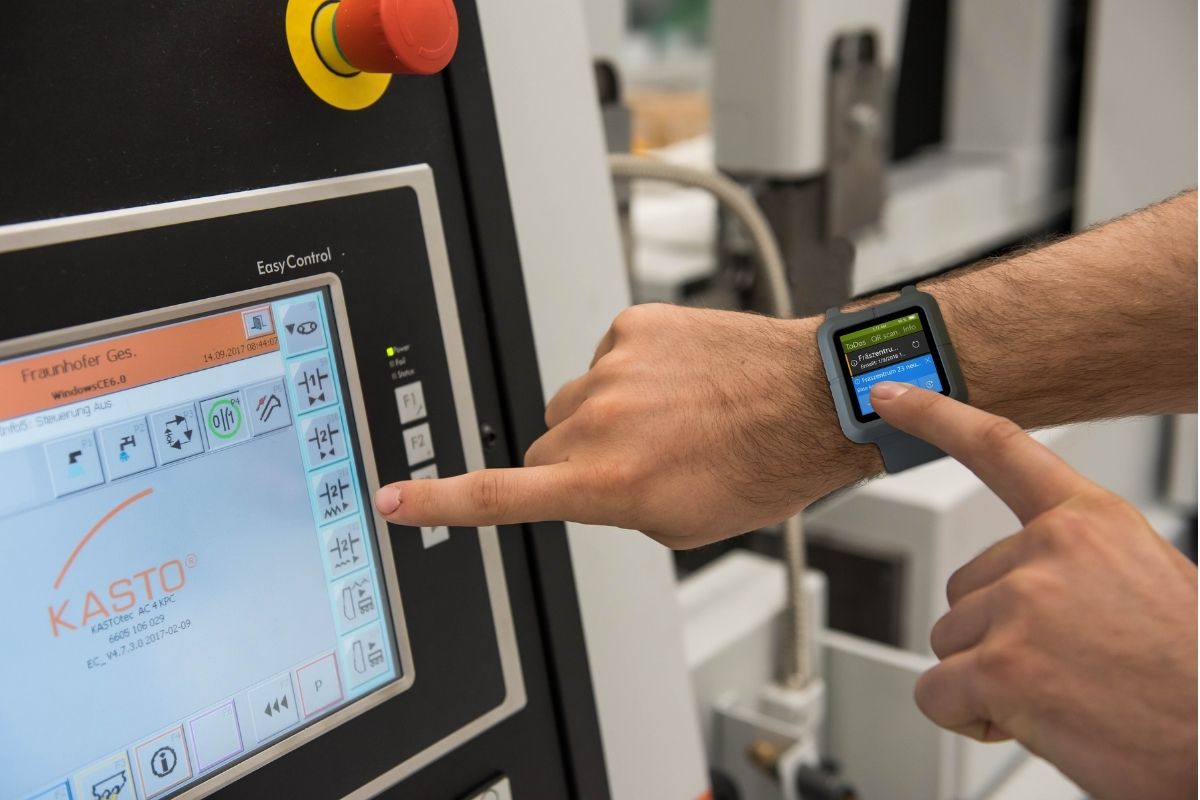Shopfloor optimization with Smart Wearables
Reducing waste and costs is one of the core issues in the Lean Production. But this alone does not necessarily lead to an improved production process and reduced costs. It is a matter of leveraging all the potential that makes up a production. However, the “last mile of digitalization” is often forgotten. The involvement of employees in production offers considerable potential! Whether in the rapid acceptance and checking of orders, through the availability of real-time data or through the digital confirmation of work steps and processes. All of this can be optimized with the help of a suitable communication platform and mobile smart devices, thereby considerably facilitating the production process, work and quality assurance in many ways.
Continuous improvement process
The CIP should lead the company to grow in the market by continuous small improvement steps and to increase the competitiveness constantly. This includes process, product and service qualities. It is a guided process to introduce new standards. In order to involve machine operators and employees more closely in these decision-making processes, it is possible for them to provide feedback on standards introduced via their industry smartwatches, thus generating an exchange between lean management, the master craftsman and employees. Problems and their solutions can thus be examined and addressed together in all their facets.
Fast acceptance/verification of orders
Different tasks require employees with specific qualifications. With the help of a central communication platform between man and machine, it is possible to send a work order specifically to a qualified employee, who can either confirm or reject it. If the employee leaves the order unanswered or rejects it for a certain period of time, it is sent automatically or semi-automatically to another competent and available employee.
Individual procedures and processes thus succeed without delays. It is no longer necessary to search for individual employees by walking around in the production area and send them work orders in the traditional way.
Availability of real-time data
By digitally storing error messages and machine failures, frequently occurring problems can be detected and can be counteracted more specifically and quickly. The machine operators of the following shifts can independently inform themselves about errors that occurred in the previous shifts and pay special attention to them. Data availability on the employee level is also important. If bottlenecks, overcapacities or process errors occur in a process, this is quickly detected and process adjustments can be done. The process of assigning different teams is also simplified, as it is stored in the system which employee has certain qualifications. The data can be stored in the central aucobo communication platform and can be easily visualized and evaluated using integrated analysis tools.
Individual function settings
In order to achieve error reduction in the store floor, it is important to challenge the employees, but not to overtax them. This can be achieved very easily by allowing individual employees to configure the Industry Smartwatch in their native language to eliminate language barriers and the resulting sources of error. In addition, new employees can be guided through individual work orders and process steps using a step-by-step option. They are thus quickly familiar with the individual processes and can be deployed directly on the store floor.
Direct Notification
If a machine has a malfunction, the aucobo platform sends an ad hoc notification to the responsible machine operator directly to his Smartwatch. No loud alarm is triggered, which causes all machine operators to stop working for a short time and check whether the alarm of one of their machines is valid. There is also no blinking light on the machine, which is often overlooked and thus greatly delays the repair or solution of the problem.
Using the aucobo system with an industrial smartwatch not only ensures that stress situations caused by lack of coordination are avoided. It also eliminates the need to constantly check screens, lamps or similar equipment on the side, resulting in more productive and efficient work.
Flexibility and Agility
Another aspect to make work on the shopfloor more effective is the transformation of cycle-controlled into event-controlled processes in logistics. The process of emptying the container for chips can be used as an example. At regular intervals, an employee drives past all the machines and has to empty the containers – regardless of whether they are overflowing or still almost empty. Our aucobo system converts this cycle-controlled process into an event-controlled process so that the chip containers are only emptied on demand. This saves the employee time that he can invest in other tasks and at the same time ensures a clean working environment.
Priority Management
If a new product is to be produced on a machine, the machine, the tools or the software often have to be modified. But the specialists are rare, usually very busy and not always on site. The resultant delays are an unnecessary waste of time.
However, if the specialist is equipped with an industrial smartwatch, he receives his requests directly from the machine operator, can schedule, prioritize and process them one after the other. In addition, the individual steps are documented and can be used as assistance for later processes.
It is clear that the integration of industrial smartwatches and the associated aucobo communication platform contributes greatly to optimizing the shopfloor and production processes and making them more efficient – both from a cost perspective and from the perspective of employee satisfaction.
This leads to long-term competitive advantages in the market and makes you to an attractive employer.
If you are interested in optimizing your shopfloor, please contact us!

